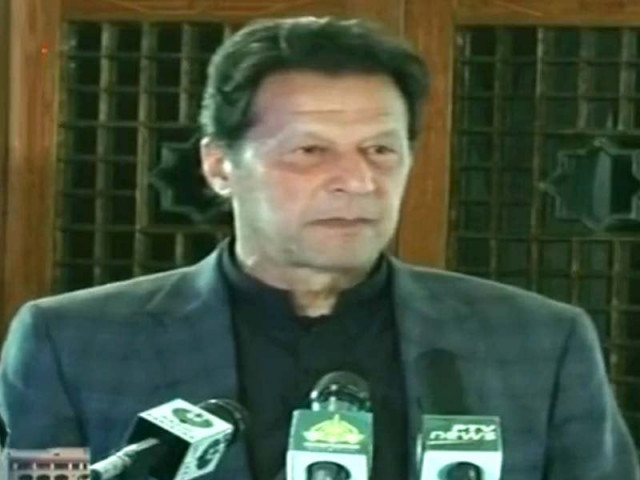PM Imran vows need-based budget allocations
Premier launches district development portal, says prosperity of Pakistan is linked to uplift of poor

Portal will help identify areas which are in most need of funds, says premier. SCREENGRAB
Prime Minister Imran Khan on Tuesday lamented the policies and practices of the previous governments, which did not consider ground realities in the budget allocations, vowing that the PTI government would earmarking the budget on the basis of need and merit.
Speaking at the launching ceremony of the district development portal under the government’s flagship ‘Ehsaas Programme’, Imran emphasised that progress and prosperity of Pakistan was linked to uplift of poor and downtrodden segments of the society.
The ‘Data4Pakistan’ portal had been developed in collaboration with the World Bank. It used data produced by the Pakistan Bureau of Statistics (PBS) to provide people access to estimates regarding poverty in every district of the country along with 120 development and policy indicators.
Addressing the ceremony, Imran said the Ehsaas district development portal would help the government spend development funds judiciously on the basis of justice and in accordance with the needs of the area people.
“The government was committed to alleviate poverty,” the prime minister told the launching ceremony, also attended by Special Assistant on Poverty Alleviation Dr Sania Nishtar “It is my belief that a country where there is an ocean of poor people and few rich cannot make progress,” he said.
“A civilised society cared for its poor, it is identified not how the rich spend their lives but how the poor were living,” he said, adding that the portal was the first step towards finding necessary ways and means to fight poverty.
“Data4Pakistan will also help in policy making at the higher level as well as allocation of budget. This portal will help identify the areas which are in the need of funds, besides finding other vital statistics about the issues facing the local people.”
Imran lamented that in the past, ground realities were not considered in making the budgetary allocations, saying that during the tenures of previous governments, powerful people spent all the development funds, which resulted in the widening of the gap between the rich and poor.
Citing the examples of disparity in the budgetary allocations, Imran said more than half of Punjab’s budget was spent on uplift of Lahore alone. “Resultantly, the metropolis became developed but other cities were ignored,” he added.
He also referred to the Isakhel Tehsil of Mianwali and Dera Ghazi Khan district of Punjab, which, he said, were backward in health, education and infrastructure, but were ignored by the past governments.
“This government will focus on equal development of all the areas,” said the prime minister. “The earmarking of the budget will now be [made] on need and merit basis, without any political or other influences.”
Earlier, Dr Nishtar told the ceremony that Data4Pakistan, provided open and public access to a spatial interactive portal that had poverty estimates for every district of Pakistan. The portal currently had six rounds of district poverty and development data for 2004-2018 period.
This portal would be a very valuable resource for federal, provincial and district level policymakers, for decision making, she said.
“Interactive maps allow the user to visualise and compare districts on poverty and two additional indicators,” she added.The innovative portal uses data produced by the PBS as part of its social and living standards measurement surveys as well as the multiple indicators custer surveys produced by the provincial bureaus of statistics.
Dr Nishtar said the indicators currently available on the portal, included a range of demographic, health, education and employment statistics as well as access to key services like water, sanitation, electricity and gas. It also provides a number of gender parity indices at the district level.
With input from APP



















COMMENTS
Comments are moderated and generally will be posted if they are on-topic and not abusive.
For more information, please see our Comments FAQ